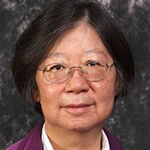 Professor (Retired)
Professor (Retired)
Research Areas
Human papillomaviruses
Biography
Louise Chow was born in Hunan Province, China. She completed her undergraduate training in Agricultural Chemistry at National Taiwan University (1965) and carried out her graduate studies in Chemistry at the California Institute of Technology (Ph.D., 1973) in the lab of Norman Davidson, developing electron microscopic heteroduplex methods to study gene organization of bacteria and their bacteriophage lysogens. After post-doctoral training at the University of California, San Francisco Medical Center, she joined Cold Spring Harbor Laboratory (1975) studying gene regulation by phage Mu DNA inversion and adenovirus transcription and replication. As a Staff Investigator (1976), she carried out the studies of the genomic origins and structures of adenovirus transcripts that led directly to the EM discovery of RNA splicing and alternative RNA processing (Cell 11:819-836 and Cell 12:1-8), and the 1993 Nobel Prize in Physiology or Medicine was awarded to her collaborator. She was appointed Senior Staff investigator (1977) and Senior Scientist with tenure (1979). She moved to the University of Rochester School of Medicine in 1984 to study the pathogenesis, molecular genetics, and biochemistry of human papillomaviruses.
She subsequently joined the faculty at UAB as Professor of Biochemistry and Molecular Genetics in 1993, and is a Senior Scientist in several Centers: Cancer, AIDS, Oral Cancer, and Cystic Fibrosis. She is an Associate Editor of Virology, served two terms on the NIH Virology Study Section, and is on the NIH Recombinant DNA Advisory Committee reviewing clinical protocols for gene therapy. She co-organized the 17th International Papillomavirus Conference. Her research is funded by the National Cancer Institute, the National Institute of Allergy and Infectious Diseases, and the National Institute of Dental Research.
Personal interests include wildlife observation, classical music, and the fine arts.
Research Interests
For 37 years, the lab of Tom Broker and myself has investigated the pathobiology of the prevalent mucosotropic human papillomaviruses (HPVs). Low-risk HPV types 6 and 11 cause most genital warts and all recurrent respiratory papillomatosis. Infections by high-risk HPVs, including types 16 and 18, can lead to neoplastic dysplasias and cancers in the anogenital tract of women and men. After discovering that HPV DNA amplifies in differentiating squamous epithelia, we optimized organotypic raft cultures of primary human keratinocytes (PHKs) grown at the liquid medium/air interface to recapitulate a full-thickness squamous epithelium. We characterized the interactions among HPV oncoproteins E6 and E7 and host proteins and pathways. Notably, E7 reactivates S-phase reentry in differentiated keratinocytes necessary to support viral DNA amplification by destabilizing p130, a pRBrelated protein. We then developed a system which achieved a robust reproductive program and produced high titers of infectious virions in PHK raft cultures using cloned wild type HPV-18 DNA. We demonstrated that HPV induces and is dependent on DNA damage responses for efficient viral DNA amplification. We showed that a key function of E6 is to inactivate the p53 tumor suppressor, enabling high level viral DNA amplification. Mutational analyses are being conducted to study the viral replicative helicase E1 and the small membrane E5 protein, which enhances signal transduction by growth factor receptors. Finally, the productive raft culture is being use as a platform to examine the effects of a number of pathway-specific inhibitors on viral DNA amplification. Very effective inhibitors have been identified, some of which are in clinical trials for various cancers. Our research suggests that it is feasible to repurpose approved inhibitors to treat HPV infections. Investigation of anti-HPV inhibitors arefurther described by N. Sanjib Banerjee, who has broadened our efforts in drug discovery to include inhibitors to treat cervical cancer.
Honors
- Birmingham International Center Spotlight on the People’s Republic of China: “Woman of Consequence Award”, May 5, 2015
- Academician, Academia Sinica, Taiwan, 2014
- Anderson Family Endowed Chair in “Medical Education, Research & Patient Care in the School of Medicine”, September, 2013
- Fellow, American Academy of Microbiology, February, 2013
- University of Alabama at Birmingham, President’s Medalist, December, 2012
- National Taiwan University President’s Award: “Distinguished Alumna in Science; Outstanding Example for Society”, Year 101 of the Republic of China, November, 2012
- National Taiwan University Department of Biochemical Science and Technology: Distinguished Achievement by an Alumna of the Department, October, 2012
- Dean’s Award for Excellence in Research, UAB School of Medicine, August, 2012
- Elected to the National Academy of Sciences, USA 2012, Read more
- American College of Physicians Medal, “in recognition of contribution to human welfare through distinguished achievement in the science of medicine”, awarded in San Francisco, 1996
- UAB Presidential Achievement Award, 1995
- Mirabella 1000 Leading Women of the 1990's, 1994
- Chinese-American Engineers and Scientists Association of Southern California Award for Outstanding Achievement in Biochemistry and Genetic Science, Los Angeles, 1994
- 1993 Nobel Prize in Physiology or Medicine awarded for a collaborative investigation on which LTC is the first author, the discovery of RNA splicing (Cell 12: 1-8, 1977)
- Top score, 1961 Taiwan Nationwide College Entrance Examination
Education
Graduate School
Ph.D., California Institute of Technology
Postdoctoral Fellowship
University of California Medical Center
California Institute of Technology
Cold Spring Harbor Laboratory
Contact
Office
Kaul Human Genetics Building
Building Room 520A
720 20th Street South
Birmingham, AL 35233
Phone
(205) 975-8300
(205) 975-8302 (fax)
Email
ltchow@uab.edu